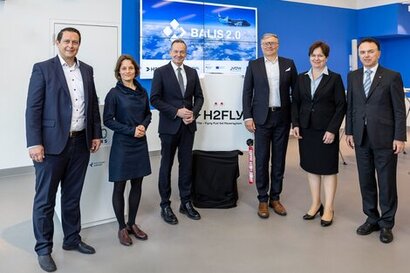
The BALIS 2.0 Project, led by H2FLY and supported by the German Aerospace Centre (DLR) and Diehl Aerospace, aims to develop and test a high-performance fuel cell system with an output of 350 kW designed for commercial aircraft applications. The 350 kW fuel cell system serves as a basic module to develop hydrogen-electric powertrain systems in the MW-class range, which could power regional aircraft with 40 – 80 seats in the future, emission-free.
H2FLY is responsible for the development and setup of the fuel cell system. In the BALIS test field, the German Aerospace Center (DLR) studies the coupling behaviour of fuel cell systems in the megawatt-class range with an electric drive and performs studies to optimise the overall system operation. Diehl Aerospace will continue to develop its high-performance and highly reliable platform technology to enable efficient coupling and scaling of fuel cell systems.
From 2024 to 2026, the BALIS 2.0 project will receive 9.3 million euros in funding from the BMDV. Funding for this initiative is also provided as part of the German Recovery and Resilience Plan (DARP) via the European Recovery and Resilience Facilities (ARF) in the NextGenerationEU programme. The funding guideline is coordinated by NOW GmbH and implemented by Project Management Jülich (PtJ). From the initial project proposal to the completion, PtJ supports all project partners ensuring that the programme objectives are successfully achieved.
“I am very proud that Germany is playing a pioneering role in developing hydrogen fuel cell systems for commercial aviation” said Dr Wissing. “This creates the technical foundation for marketable solutions for tomorrow’s CO2-neutral flying. Companies and research institutions, like those in the BALIS 2.0 project consortium, are leading the way with great expertise and a pioneering spirit. The defossilisation of aviation is an immense global challenge. Hydrogen offers great potential to significantly contribute to achieving climate targets and realising CO2-neutral global travel and freight transport in the future.”
Korinna Jörling, Head of the Hydrogen, Alternative Fuels and Fuel Cells Division, NOW GmbH added that BALIS 2.0 represents a significant milestone for a sustainable future in aviation and that developing and implementing hydrogen technology in aviation isn’t just a major step forward, it’s also a critical response to the urgent challenges of climate change.
“Investment and innovation in this area underscore the vital role of public funding for pioneering technologies and their transformative impact on the aviation industry” said Ms Jörling.
For additional information:

